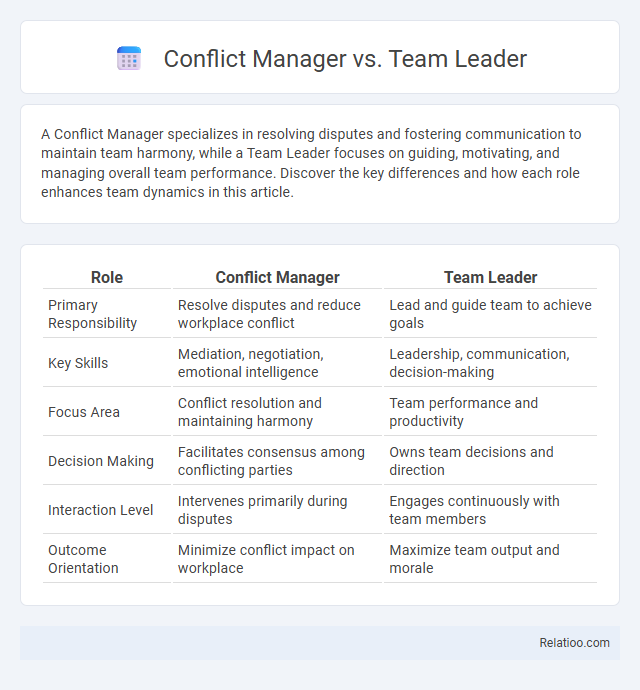A Conflict Manager specializes in resolving disputes and fostering communication to maintain team harmony, while a Team Leader focuses on guiding, motivating, and managing overall team performance. Discover the key differences and how each role enhances team dynamics in this article.
Table of Comparison
| Role | Conflict Manager | Team Leader |
|---|---|---|
| Primary Responsibility | Resolve disputes and reduce workplace conflict | Lead and guide team to achieve goals |
| Key Skills | Mediation, negotiation, emotional intelligence | Leadership, communication, decision-making |
| Focus Area | Conflict resolution and maintaining harmony | Team performance and productivity |
| Decision Making | Facilitates consensus among conflicting parties | Owns team decisions and direction |
| Interaction Level | Intervenes primarily during disputes | Engages continuously with team members |
| Outcome Orientation | Minimize conflict impact on workplace | Maximize team output and morale |
Understanding the Roles: Conflict Manager vs Team Leader
Understanding the roles of Conflict Manager and Team Leader reveals distinct responsibilities: Conflict Managers specialize in identifying, mediating, and resolving workplace disputes to maintain a harmonious environment. Team Leaders oversee group dynamics, focusing on task delegation, motivation, and achieving team goals while occasionally addressing conflicts. Effective organizational performance relies on the clear delineation between these roles to ensure both conflict resolution and cohesive team management.
Key Responsibilities of a Conflict Manager
A Conflict Manager specializes in identifying, addressing, and resolving disputes within an organization to maintain a harmonious work environment and improve overall productivity. Your role involves mediating disagreements, implementing conflict resolution strategies, and training team members in effective communication techniques. Unlike a Team Leader who oversees team performance and project goals, the Conflict Manager primarily focuses on managing interpersonal dynamics and fostering constructive collaboration.
Key Responsibilities of a Team Leader
A Team Leader primarily focuses on coordinating team activities, setting performance goals, and ensuring effective communication to enhance productivity and morale. Unlike a Conflict Manager who specializes in resolving disputes and facilitating negotiations, a Team Leader integrates conflict resolution into broader leadership duties to maintain team cohesion. Key responsibilities include task delegation, progress monitoring, and fostering a collaborative environment.
Skills Required for Effective Conflict Management
Effective conflict management requires distinct skills tailored to specific roles such as Conflict Manager, Team Leader, and Conflict Consultant. A Conflict Manager must excel in negotiation, emotional intelligence, and mediation techniques to resolve disputes efficiently. Team Leaders benefit from strong communication, empathy, and problem-solving abilities to maintain team cohesion, while Conflict Consultants need analytical skills and strategic thinking to design conflict resolution frameworks and training programs.
Leadership Qualities Essential for Team Leaders
Effective leadership in conflict management requires a blend of empathy, communication, and decisiveness, traits essential for team leaders to uniting diverse group members. Conflict managers often specialize in resolving disputes through negotiation and mediation, while team leaders integrate these skills with strategic vision and motivation to drive team performance. Mastering emotional intelligence and fostering an inclusive environment are critical leadership qualities that distinguish successful team leaders from conflict managers alone.
Differences in Approach: Conflict Resolution vs Team Guidance
Conflict managers primarily focus on resolving disputes by identifying underlying issues, facilitating communication, and negotiating solutions to restore harmony. Team leaders emphasize guiding team members towards common goals by fostering collaboration, motivation, and productivity while maintaining a positive work environment. The fundamental difference lies in conflict managers addressing interpersonal tensions directly, whereas team leaders concentrate on overall team dynamics and performance management.
Collaboration Between Conflict Managers and Team Leaders
Collaboration between conflict managers and team leaders enhances workplace harmony and productivity by effectively addressing disputes and fostering open communication. While conflict managers specialize in resolving disputes through mediation techniques, team leaders play a crucial role in identifying conflicts early and maintaining team cohesion. Integrating conflict management strategies with leadership skills ensures proactive conflict resolution and strengthens team dynamics.
Impact on Team Dynamics and Workplace Culture
A Conflict Manager plays a crucial role in identifying and resolving disputes by fostering open communication and creating a safe space for dialogue, which directly improves team cohesion and reduces workplace tension. A Team Leader influences team dynamics by setting clear expectations, motivating members, and modeling effective conflict resolution, thereby shaping a positive workplace culture that encourages collaboration and trust. Your choice between these roles impacts how conflict is managed and how team members interact, ultimately determining the overall productivity and morale within the workplace.
Common Challenges Faced by Conflict Managers and Team Leaders
Conflict managers and team leaders both face common challenges such as addressing communication breakdowns, managing diverse personalities, and resolving disputes efficiently to maintain team cohesion. Your ability to balance assertiveness with empathy is crucial when navigating these conflicts, ensuring that all parties feel heard and understood. Both roles demand strong emotional intelligence and strategic problem-solving skills to foster a positive work environment and avoid escalation.
Choosing the Right Role for Your Organization
Choosing the right role between Conflict Manager, Team Leader, and Conflict Manager involves assessing your organization's specific needs for conflict resolution, leadership style, and team dynamics. A Conflict Manager specializes in diagnosing and resolving disputes to maintain workplace harmony, while a Team Leader oversees overall team performance, motivation, and collaboration. Your decision should align with the scale of conflicts, the leadership approach required, and the desired impact on team productivity and morale.

Infographic: Conflict Manager vs Team Leader
 relatioo.com
relatioo.com